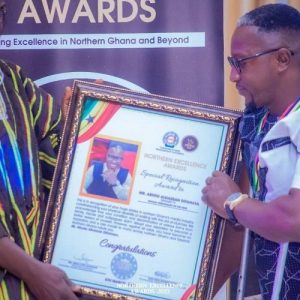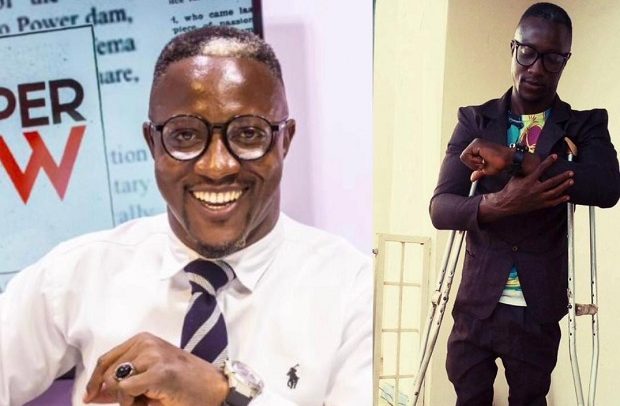Abudu Alhassan Difahaya before and after
“Many would not call me by my name but rather ‘Gbargu’ which means ‘the cripple’. The few ones who wanted to describe me well attached my real name to the wrong name given to me. So in short they called me ‘Alhassan Gbargu’.” – The story of Abudu Alhassan Difahaya, 40, a disabled man in Nyankpala in the Northern Region.
Despite facing numerous challenges and obstacles, Abudu Alhassan Difahaya has defied all odds to become a celebrated journalist in Northern Ghana.
From a young age, he was determined to pursue his passion for writing and reporting despite his physical limitations.
Throughout his journey, he faced discrimination, lack of accessibility, and skepticism from others who doubted his abilities. However, he persevered and worked tirelessly to prove himself in the media industry as one of the best broadcast journalists in Northern Ghana.
Mr. Abudu Alhassan Difahaya works with Sagani TV and Radio Justice based in Tamale.
In an exclusive interview with Abudu Alhassan Difahaya, he told DAILY GUIDE that he became physically challenged at the age of two.
He narrated that things were difficult for him in the Nyankpala community where he lived due to stigmatisation and wrongful name-calling attributed to him. His disability compelled him to stop going to school.
“It all started when one day my mother woke me up from bed and asked me to go and take my bath but I could not feel my legs and that’s where my predicament began,” he said.
According to him, in 1996 his parents sent him to Duayaw Nkwanta in the then Brong Ahafo Region to undergo surgery on his legs.
“After three months, I was sent to Nsawam Orthopedic Training Centre to start learning how to walk with the aid of the crutches. I can remember the very first day I stood up. It took me more than an hour to move a leg. After days of rehearsals, I could now walk slowly and slowly till I was perfect,” he narrated.
Abudu Alhassan Difahaya, recounted that the entire community members and his friends jubilated when he returned to the community and walked.
“When I returned to my community, many of my friends celebrated me for seeing me differently after being away from them for some months. I went back to school and joined my colleagues who were now in primary six and continued my education,” he continued.
He says he had faced discrimination growing up due to his disability but has overcome it which has made him strong and confident.
“During the selection of Senior High Schools as choices, I chose (school name withheld) as my first, second, and third choices, but with different courses. My first course was general arts whilst my second and third courses were agricultural science and visual arts respectively. I did this because (school name withheld) was the school I wanted to attend.
“When the results were out, my uncle, who completed the school and was an assistant School Prefect, went to check on my admission on the notice board but did not find my name. So we made further inquiries to find out what the problem was.
“Later, our inquiries revealed that I had been admitted into the school. We then confronted the school management who initially denied that I was admitted there. So we reported it to the regional disability executives who pursued the matter, and my name was found on the list somewhere.
“They apologised to us and admitted me into the school, but on my second choice which was the agricultural science,” he says.
Through hard work, dedication, and a strong belief in himself, he was able to break into the competitive world of journalism and make a name for himself.
He has since become a respected figure in the field, known for his insightful reporting and compelling storytelling as a journalist.
Abudu Alhassan Difahaya has won numerous awards including the Northern Excellence Award as the Special Personality of the Year, in 2022.
He has also impacted members of the disability community through his mentorship and guidance which has helped them to achieve great academic status and well-paid jobs across the country.
“I have thought a lot of my colleagues in school, advocated for support from World Vision like school bags, school fees, uniforms, and other learning materials to encourage and support them to achieve greater heights, and now some of them are even working in big institutions while some have obtained their master’s degree now,” he revealed.
Abudu Alhassan Difahaya advised persons with disabilities not to allow their condition to be an obstacle to them.
“I want to appeal to my colleagues not to allow their disabilities to be an obstacle to make their dreams come through, in every situation there are challenges, even people who are not persons with disabilities have challenges so they should try until they succeed,” he urged.

Abudu Alhassan Difahaya receiving the Northern Excellence Award as the Special Personality of the Year,2022
Support
Abudu Alhassan Difahaya called on the government to implement deliberate policies that will help persons with disabilities in society saying, “In the employment system, I think a percentage should be allocated for persons with disability to support and encourage us to contribute our quota for the development of the country and through this, we will be respected in society.”
He also called for sponsorship for his Television show ‘Disability Hour’ on Sagani TV, Tamale, as a way of allowing his colleagues to tell their stories and to encourage others to showcase their potential and ability.
Abudu Alhassan Difahaya is aspiring to be an academic and currently pursuing a degree at the Tamale Technical University and determined to continue with a master’s degree after completion, but he is financing his education on his own and called for support to achieve his dreams.
“I am currently paying my fees and taking care of my family which is not easy, so what I need now is anybody who can help me through education, I don’t want anybody to give me money to spend but rather help me to achieve my dreams through education,” he said.
He urged parents not to reject their children who are born with some disabilities and that they can still achieve their dreams even in their condition. He added, “Whatever you do just know that God in his wisdom is what he has given to you, so please accept the children, take a careful look at them and see what kind of support you can give to them as a parent because we have persons with disabilities in the world who are doing great things than what the able person can do so let’s support them and not reject them.”
Discrimination
There are about 2,310,939 persons with disabilities across the Northern Region according to the 2021 population census.
Persons with disabilities have been rejected and discriminated against in terms of jobs and other opportunities by institutions and organisations due to their disability status even though Ghana has passed the Persons with Disability Act, 2006 (Act 715).
The Northern Regional President of the Ghana Federation of Disability Organisations, Abubakari Sahadatu Nimah, in an interview with DAILY GUIDE, called for severe punishment for people who discriminate and stigmatise persons with disabilities to serve as a deterrent for others.
The United Nations Convention on the Rights of Persons with Disabilities (CRPD) seeks to promote, protect, and ensure the full and equal enjoyment of all human rights and fundamental freedoms by all persons with disabilities, and to promote respect for their inherent dignity.
SDG
The Sustainable Development Goal Eight, which Ghana has signed, aims to promote inclusive and sustainable economic growth, full and productive employment, and decent work for all including persons with disabilities.
Also, Sustainable Development Goal 10 aims at reducing inequality within and among countries. This SDG calls for reducing inequalities in income as well as those based on age, sex, disability, race, ethnicity, origin, religion, or economic or other status within a country.
GJA Chairman
Northern Regional Chairman of the Ghana Journalists Association (GJA), Mr. Yakubu Abdul-Majeed, in an interview with DGN Online, said Journalism is a noble and respectable profession that seeks to promote the welfare of all citizens and that it would therefore be desirous and amazing for persons with disabilities to acquire journalism skills or becomes journalists and commended Abudu Alhassan Difahaya for his achievements in the field of journalism.
According to him, persons with disabilities practicing journalism would not only be explaining the challenges confronting them to the duty barriers but would help in canvassing for solutions to their challenges.
“A disabled journalist would serve as an advocate for the compliance of such constitutional rights of people living with disabilities and I will therefore strongly advise people with disabilities to venture into journalism as these will help build a strong society,” Mr. Yakubu Abdul-Majeed stated.
Abudu Alhassan Difahaya’s story serves as an inspiration to many, showing that with determination and perseverance, anyone can achieve their dreams, regardless of the challenges they may face.
He has proven that disability is not a hindrance to success, but rather a unique perspective that can bring valuable insights to the world of journalism.
BY Eric Kombat


